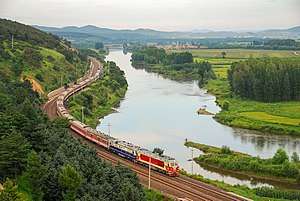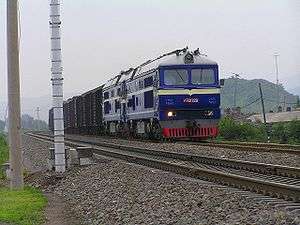Harbin–Suifenhe railway
The Harbin–Suifenhe railway, named the Binsui Railway (simplified Chinese: 滨绥铁路; traditional Chinese: 濱綏鐵路; pinyin: bīnsuí tiělù), is a double-track electrified trunk railway in Northeast China between Harbin and Suifenhe on the Russian border. The line was originally built by Russia as the eastern branch of the Chinese Eastern Railway, which linked Chita with Vladivostok. Today, the 548 km (341 mi) railway is administered by Harbin Railway Bureau.
| Binsui Railway | ||||||||||||||||||||||||||||||||||||||||||||||||||||||||||||||||||||||||||||||||||||||||||||||||||||||||||||||||||||||||||||||||||||||||||||||||||||||||||||||||||||||||||||||||||||||||||||||||||||||||||||||||||||||||||||||||||||||||||||||||||||||||||||||||||||||||||||||||||||||||||||||||||||||||||||||||||||||||||||||||||||||||||||||||||||||||||||||||||||||||||||||||||||||||||||||||||||||||||||||||||||||||||||||||||||||||||||||||||||||||||||||||||||||||||||||||||||||||||||||||||||||||||||||||||||||||||||||||||||||||||||||||||||||||||||||||||||||||||||||||||||||||||||||||||||||||||||||||||||||||||||||||||||||||||||||||||||||||||||||||||||||||||||||||||||||||||||||
|---|---|---|---|---|---|---|---|---|---|---|---|---|---|---|---|---|---|---|---|---|---|---|---|---|---|---|---|---|---|---|---|---|---|---|---|---|---|---|---|---|---|---|---|---|---|---|---|---|---|---|---|---|---|---|---|---|---|---|---|---|---|---|---|---|---|---|---|---|---|---|---|---|---|---|---|---|---|---|---|---|---|---|---|---|---|---|---|---|---|---|---|---|---|---|---|---|---|---|---|---|---|---|---|---|---|---|---|---|---|---|---|---|---|---|---|---|---|---|---|---|---|---|---|---|---|---|---|---|---|---|---|---|---|---|---|---|---|---|---|---|---|---|---|---|---|---|---|---|---|---|---|---|---|---|---|---|---|---|---|---|---|---|---|---|---|---|---|---|---|---|---|---|---|---|---|---|---|---|---|---|---|---|---|---|---|---|---|---|---|---|---|---|---|---|---|---|---|---|---|---|---|---|---|---|---|---|---|---|---|---|---|---|---|---|---|---|---|---|---|---|---|---|---|---|---|---|---|---|---|---|---|---|---|---|---|---|---|---|---|---|---|---|---|---|---|---|---|---|---|---|---|---|---|---|---|---|---|---|---|---|---|---|---|---|---|---|---|---|---|---|---|---|---|---|---|---|---|---|---|---|---|---|---|---|---|---|---|---|---|---|---|---|---|---|---|---|---|---|---|---|---|---|---|---|---|---|---|---|---|---|---|---|---|---|---|---|---|---|---|---|---|---|---|---|---|---|---|---|---|---|---|---|---|---|---|---|---|---|---|---|---|---|---|---|---|---|---|---|---|---|---|---|---|---|---|---|---|---|---|---|---|---|---|---|---|---|---|---|---|---|---|---|---|---|---|---|---|---|---|---|---|---|---|---|---|---|---|---|---|---|---|---|---|---|---|---|---|---|---|---|---|---|---|---|---|---|---|---|---|---|---|---|---|---|---|---|---|---|---|---|---|---|---|---|---|---|---|---|---|---|---|---|---|---|---|---|---|---|---|---|---|---|---|---|---|---|---|---|---|---|---|---|---|---|---|---|---|---|---|---|---|---|---|---|---|---|---|---|---|---|---|---|---|---|---|---|---|---|---|---|---|---|---|---|---|---|---|---|---|---|---|---|---|---|---|---|---|---|---|---|---|---|---|---|---|---|---|---|---|---|---|---|---|---|---|---|---|---|---|---|---|---|---|---|---|---|---|---|---|---|---|---|---|---|---|---|---|---|---|---|---|---|---|---|---|---|---|---|---|---|---|---|---|---|---|---|---|---|---|---|---|---|---|---|---|---|---|---|---|---|---|---|---|---|---|---|---|---|---|---|---|---|---|---|---|---|---|---|---|---|---|---|---|---|---|---|---|---|---|---|---|---|---|---|---|---|---|---|---|---|---|---|---|---|---|---|---|---|---|---|---|---|---|---|---|---|---|---|---|---|---|---|---|---|---|---|---|---|---|---|---|---|---|---|---|---|---|---|---|---|---|---|---|---|---|---|---|---|---|---|---|---|---|---|---|---|---|---|---|---|
 Train K1452 on the Binsui Railway along the Hailang River near Hailin | ||||||||||||||||||||||||||||||||||||||||||||||||||||||||||||||||||||||||||||||||||||||||||||||||||||||||||||||||||||||||||||||||||||||||||||||||||||||||||||||||||||||||||||||||||||||||||||||||||||||||||||||||||||||||||||||||||||||||||||||||||||||||||||||||||||||||||||||||||||||||||||||||||||||||||||||||||||||||||||||||||||||||||||||||||||||||||||||||||||||||||||||||||||||||||||||||||||||||||||||||||||||||||||||||||||||||||||||||||||||||||||||||||||||||||||||||||||||||||||||||||||||||||||||||||||||||||||||||||||||||||||||||||||||||||||||||||||||||||||||||||||||||||||||||||||||||||||||||||||||||||||||||||||||||||||||||||||||||||||||||||||||||||||||||||||||||||||||
| Overview | ||||||||||||||||||||||||||||||||||||||||||||||||||||||||||||||||||||||||||||||||||||||||||||||||||||||||||||||||||||||||||||||||||||||||||||||||||||||||||||||||||||||||||||||||||||||||||||||||||||||||||||||||||||||||||||||||||||||||||||||||||||||||||||||||||||||||||||||||||||||||||||||||||||||||||||||||||||||||||||||||||||||||||||||||||||||||||||||||||||||||||||||||||||||||||||||||||||||||||||||||||||||||||||||||||||||||||||||||||||||||||||||||||||||||||||||||||||||||||||||||||||||||||||||||||||||||||||||||||||||||||||||||||||||||||||||||||||||||||||||||||||||||||||||||||||||||||||||||||||||||||||||||||||||||||||||||||||||||||||||||||||||||||||||||||||||||||||||
| Native name | 滨绥铁路 (Bīnsuí Tiělù) | |||||||||||||||||||||||||||||||||||||||||||||||||||||||||||||||||||||||||||||||||||||||||||||||||||||||||||||||||||||||||||||||||||||||||||||||||||||||||||||||||||||||||||||||||||||||||||||||||||||||||||||||||||||||||||||||||||||||||||||||||||||||||||||||||||||||||||||||||||||||||||||||||||||||||||||||||||||||||||||||||||||||||||||||||||||||||||||||||||||||||||||||||||||||||||||||||||||||||||||||||||||||||||||||||||||||||||||||||||||||||||||||||||||||||||||||||||||||||||||||||||||||||||||||||||||||||||||||||||||||||||||||||||||||||||||||||||||||||||||||||||||||||||||||||||||||||||||||||||||||||||||||||||||||||||||||||||||||||||||||||||||||||||||||||||||||||||||
| Type | Heavy rail, Regional rail | |||||||||||||||||||||||||||||||||||||||||||||||||||||||||||||||||||||||||||||||||||||||||||||||||||||||||||||||||||||||||||||||||||||||||||||||||||||||||||||||||||||||||||||||||||||||||||||||||||||||||||||||||||||||||||||||||||||||||||||||||||||||||||||||||||||||||||||||||||||||||||||||||||||||||||||||||||||||||||||||||||||||||||||||||||||||||||||||||||||||||||||||||||||||||||||||||||||||||||||||||||||||||||||||||||||||||||||||||||||||||||||||||||||||||||||||||||||||||||||||||||||||||||||||||||||||||||||||||||||||||||||||||||||||||||||||||||||||||||||||||||||||||||||||||||||||||||||||||||||||||||||||||||||||||||||||||||||||||||||||||||||||||||||||||||||||||||||
| Status | Operational | |||||||||||||||||||||||||||||||||||||||||||||||||||||||||||||||||||||||||||||||||||||||||||||||||||||||||||||||||||||||||||||||||||||||||||||||||||||||||||||||||||||||||||||||||||||||||||||||||||||||||||||||||||||||||||||||||||||||||||||||||||||||||||||||||||||||||||||||||||||||||||||||||||||||||||||||||||||||||||||||||||||||||||||||||||||||||||||||||||||||||||||||||||||||||||||||||||||||||||||||||||||||||||||||||||||||||||||||||||||||||||||||||||||||||||||||||||||||||||||||||||||||||||||||||||||||||||||||||||||||||||||||||||||||||||||||||||||||||||||||||||||||||||||||||||||||||||||||||||||||||||||||||||||||||||||||||||||||||||||||||||||||||||||||||||||||||||||
| Locale | Heilongjiang, Inner Mongolia | |||||||||||||||||||||||||||||||||||||||||||||||||||||||||||||||||||||||||||||||||||||||||||||||||||||||||||||||||||||||||||||||||||||||||||||||||||||||||||||||||||||||||||||||||||||||||||||||||||||||||||||||||||||||||||||||||||||||||||||||||||||||||||||||||||||||||||||||||||||||||||||||||||||||||||||||||||||||||||||||||||||||||||||||||||||||||||||||||||||||||||||||||||||||||||||||||||||||||||||||||||||||||||||||||||||||||||||||||||||||||||||||||||||||||||||||||||||||||||||||||||||||||||||||||||||||||||||||||||||||||||||||||||||||||||||||||||||||||||||||||||||||||||||||||||||||||||||||||||||||||||||||||||||||||||||||||||||||||||||||||||||||||||||||||||||||||||||
| Termini | Harbin Manzhouli | |||||||||||||||||||||||||||||||||||||||||||||||||||||||||||||||||||||||||||||||||||||||||||||||||||||||||||||||||||||||||||||||||||||||||||||||||||||||||||||||||||||||||||||||||||||||||||||||||||||||||||||||||||||||||||||||||||||||||||||||||||||||||||||||||||||||||||||||||||||||||||||||||||||||||||||||||||||||||||||||||||||||||||||||||||||||||||||||||||||||||||||||||||||||||||||||||||||||||||||||||||||||||||||||||||||||||||||||||||||||||||||||||||||||||||||||||||||||||||||||||||||||||||||||||||||||||||||||||||||||||||||||||||||||||||||||||||||||||||||||||||||||||||||||||||||||||||||||||||||||||||||||||||||||||||||||||||||||||||||||||||||||||||||||||||||||||||||
| Operation | ||||||||||||||||||||||||||||||||||||||||||||||||||||||||||||||||||||||||||||||||||||||||||||||||||||||||||||||||||||||||||||||||||||||||||||||||||||||||||||||||||||||||||||||||||||||||||||||||||||||||||||||||||||||||||||||||||||||||||||||||||||||||||||||||||||||||||||||||||||||||||||||||||||||||||||||||||||||||||||||||||||||||||||||||||||||||||||||||||||||||||||||||||||||||||||||||||||||||||||||||||||||||||||||||||||||||||||||||||||||||||||||||||||||||||||||||||||||||||||||||||||||||||||||||||||||||||||||||||||||||||||||||||||||||||||||||||||||||||||||||||||||||||||||||||||||||||||||||||||||||||||||||||||||||||||||||||||||||||||||||||||||||||||||||||||||||||||||
| Opened | 14 November 1901 | |||||||||||||||||||||||||||||||||||||||||||||||||||||||||||||||||||||||||||||||||||||||||||||||||||||||||||||||||||||||||||||||||||||||||||||||||||||||||||||||||||||||||||||||||||||||||||||||||||||||||||||||||||||||||||||||||||||||||||||||||||||||||||||||||||||||||||||||||||||||||||||||||||||||||||||||||||||||||||||||||||||||||||||||||||||||||||||||||||||||||||||||||||||||||||||||||||||||||||||||||||||||||||||||||||||||||||||||||||||||||||||||||||||||||||||||||||||||||||||||||||||||||||||||||||||||||||||||||||||||||||||||||||||||||||||||||||||||||||||||||||||||||||||||||||||||||||||||||||||||||||||||||||||||||||||||||||||||||||||||||||||||||||||||||||||||||||||
| Owner | Chinese Eastern Railway (1901–1932) North Manchuria Railway (1932–1935) Manchukuo National Railway (1935–1945) China Changchun Railway (1945–1955) China Railway (since 1955) | |||||||||||||||||||||||||||||||||||||||||||||||||||||||||||||||||||||||||||||||||||||||||||||||||||||||||||||||||||||||||||||||||||||||||||||||||||||||||||||||||||||||||||||||||||||||||||||||||||||||||||||||||||||||||||||||||||||||||||||||||||||||||||||||||||||||||||||||||||||||||||||||||||||||||||||||||||||||||||||||||||||||||||||||||||||||||||||||||||||||||||||||||||||||||||||||||||||||||||||||||||||||||||||||||||||||||||||||||||||||||||||||||||||||||||||||||||||||||||||||||||||||||||||||||||||||||||||||||||||||||||||||||||||||||||||||||||||||||||||||||||||||||||||||||||||||||||||||||||||||||||||||||||||||||||||||||||||||||||||||||||||||||||||||||||||||||||||
| Technical | ||||||||||||||||||||||||||||||||||||||||||||||||||||||||||||||||||||||||||||||||||||||||||||||||||||||||||||||||||||||||||||||||||||||||||||||||||||||||||||||||||||||||||||||||||||||||||||||||||||||||||||||||||||||||||||||||||||||||||||||||||||||||||||||||||||||||||||||||||||||||||||||||||||||||||||||||||||||||||||||||||||||||||||||||||||||||||||||||||||||||||||||||||||||||||||||||||||||||||||||||||||||||||||||||||||||||||||||||||||||||||||||||||||||||||||||||||||||||||||||||||||||||||||||||||||||||||||||||||||||||||||||||||||||||||||||||||||||||||||||||||||||||||||||||||||||||||||||||||||||||||||||||||||||||||||||||||||||||||||||||||||||||||||||||||||||||||||||
| Line length | 548 km (341 mi) | |||||||||||||||||||||||||||||||||||||||||||||||||||||||||||||||||||||||||||||||||||||||||||||||||||||||||||||||||||||||||||||||||||||||||||||||||||||||||||||||||||||||||||||||||||||||||||||||||||||||||||||||||||||||||||||||||||||||||||||||||||||||||||||||||||||||||||||||||||||||||||||||||||||||||||||||||||||||||||||||||||||||||||||||||||||||||||||||||||||||||||||||||||||||||||||||||||||||||||||||||||||||||||||||||||||||||||||||||||||||||||||||||||||||||||||||||||||||||||||||||||||||||||||||||||||||||||||||||||||||||||||||||||||||||||||||||||||||||||||||||||||||||||||||||||||||||||||||||||||||||||||||||||||||||||||||||||||||||||||||||||||||||||||||||||||||||||||
| Track gauge | 1,435 mm (4 ft 8 1⁄2 in) standard gauge | |||||||||||||||||||||||||||||||||||||||||||||||||||||||||||||||||||||||||||||||||||||||||||||||||||||||||||||||||||||||||||||||||||||||||||||||||||||||||||||||||||||||||||||||||||||||||||||||||||||||||||||||||||||||||||||||||||||||||||||||||||||||||||||||||||||||||||||||||||||||||||||||||||||||||||||||||||||||||||||||||||||||||||||||||||||||||||||||||||||||||||||||||||||||||||||||||||||||||||||||||||||||||||||||||||||||||||||||||||||||||||||||||||||||||||||||||||||||||||||||||||||||||||||||||||||||||||||||||||||||||||||||||||||||||||||||||||||||||||||||||||||||||||||||||||||||||||||||||||||||||||||||||||||||||||||||||||||||||||||||||||||||||||||||||||||||||||||
| Old gauge | 1,520 mm (4 ft 11 27⁄32 in) Russian gauge | |||||||||||||||||||||||||||||||||||||||||||||||||||||||||||||||||||||||||||||||||||||||||||||||||||||||||||||||||||||||||||||||||||||||||||||||||||||||||||||||||||||||||||||||||||||||||||||||||||||||||||||||||||||||||||||||||||||||||||||||||||||||||||||||||||||||||||||||||||||||||||||||||||||||||||||||||||||||||||||||||||||||||||||||||||||||||||||||||||||||||||||||||||||||||||||||||||||||||||||||||||||||||||||||||||||||||||||||||||||||||||||||||||||||||||||||||||||||||||||||||||||||||||||||||||||||||||||||||||||||||||||||||||||||||||||||||||||||||||||||||||||||||||||||||||||||||||||||||||||||||||||||||||||||||||||||||||||||||||||||||||||||||||||||||||||||||||||
| Electrification | Overhead lines 25 KV AC 50 Hz | |||||||||||||||||||||||||||||||||||||||||||||||||||||||||||||||||||||||||||||||||||||||||||||||||||||||||||||||||||||||||||||||||||||||||||||||||||||||||||||||||||||||||||||||||||||||||||||||||||||||||||||||||||||||||||||||||||||||||||||||||||||||||||||||||||||||||||||||||||||||||||||||||||||||||||||||||||||||||||||||||||||||||||||||||||||||||||||||||||||||||||||||||||||||||||||||||||||||||||||||||||||||||||||||||||||||||||||||||||||||||||||||||||||||||||||||||||||||||||||||||||||||||||||||||||||||||||||||||||||||||||||||||||||||||||||||||||||||||||||||||||||||||||||||||||||||||||||||||||||||||||||||||||||||||||||||||||||||||||||||||||||||||||||||||||||||||||||
| ||||||||||||||||||||||||||||||||||||||||||||||||||||||||||||||||||||||||||||||||||||||||||||||||||||||||||||||||||||||||||||||||||||||||||||||||||||||||||||||||||||||||||||||||||||||||||||||||||||||||||||||||||||||||||||||||||||||||||||||||||||||||||||||||||||||||||||||||||||||||||||||||||||||||||||||||||||||||||||||||||||||||||||||||||||||||||||||||||||||||||||||||||||||||||||||||||||||||||||||||||||||||||||||||||||||||||||||||||||||||||||||||||||||||||||||||||||||||||||||||||||||||||||||||||||||||||||||||||||||||||||||||||||||||||||||||||||||||||||||||||||||||||||||||||||||||||||||||||||||||||||||||||||||||||||||||||||||||||||||||||||||||||||||||||||||||||||||

History
Initial construction of the Binsui Railway as a Russian gauge line of the Sino-Russian Chinese Eastern Railway started on 9 June 1898 at the two termini of the line, Harbin in China and Ussuriysk in Russia. The partially built line was destroyed during the Boxer Rebellion between March and July 1900, causing the project to be suspended. Construction resumed in October, and on 14 November 1901 operation on a temporary basis was started. Official opening of the line took place on 14 July 1903.
After the creation of the Japanese puppet state of Manchukuo in 1932, the CER became a Soviet-Manchukuo joint enterprise, and was renamed the "North Manchuria Railway". In March 1935, the government of Manchukuo purchased the Soviet share of the NMR, and merged it into the Manchukuo National Railway, and on 17 June 1936, work to convert the line, known during that time as the Binsui Line (Hinsui Line in Japanese), from Russian broad gauge to standard gauge was completed. The MNR double tracked the line as far as Yimianpo in 1939, and relaid the line with heavier rail in 1942.
The MNR began construction of the original Ducao Tunnel in July 1937, opening the new, shorter line on 31 July 1942. At 3,849 m (12,628 ft), it was China's longest railway tunnel. To expand the capacity of the line, China Railway decided to build a second tunnel, 3,900 m (12,800 ft) in length, in 1961, but construction was suspended a year later. Work resumed on 1 May 1975, and was completed by the end of 1978. Refurbishment of the original tunnel began in September 1985 and was completed on 21 December 1988.
After the Soviet invasion of Manchuria in 1945, the Soviet Army converted the line back to Russian broad gauge. In 1946, it was converted back to standard gauge once again, and the double tracking was removed; the rails taken up were used to repair other lines.[1] Between 1945 and 1955, the railways in the territory of the former Manchukuo were controlled by the Sino-Soviet China Changchun Railway, after which the railways of the region were taken over by China Railways; the Binsui Line then reverted to its original name, Binsui Railway. The double tracking of the section from Harbin to Mudanjiang was rebuilt by China Railways in 1958. Electrification of the line began in 2010, and the first section, from Mudanjiang to Suifenhe, was completed on 28 December 2015. Wiring of the Harbin–Mudanjiang section began in April 2016.[2] Passenger traffic on the line has increased to 2.3 million passengers annually.[3]
Route
| Distance | Station name | |||||
|---|---|---|---|---|---|---|
| Total; km | S2S; km | Current name | Former name | Year opened | Connections | |
| 0 | 0 | Harbin 哈尔滨 |
Songhuajiang 松花江 |
1899 | Binbei Railway, Jingha Railway, Binzhou Railway, Binbei Railway | |
| 5 | 5 | Wangzhaotun 王兆屯 |
Muchaichang 木柴厂 |
1899 | ||
| 7 | 2 | Xiangfang 香坊 |
Harbin 哈尔滨, Харбин (1898–1904) Old Harbin 老哈尔滨 (1904–1924) |
1898 | Labin Railway | |
| 14 | 7 | New Xiangfang 新香坊 |
1937 | Sunxin Connecting Line, Sankeshu Railway (zh) | ||
| 20 | 6 | Chenggaozi 成高子 |
Chengbin Railway (zh) | |||
| 30 | 10 | Shelitun 舍利屯 |
Cheng 程 |
|||
| 41 | 11 | Acheng 阿城 |
Ashenhe 阿什河 |
1901 | ||
| Closed | ||||||
| 52 | 11 | Yagou 亚沟 |
Taiyagou 太亚沟 |
|||
| 62 | 10 | Yuquan 玉泉 |
Ercengdianzi 二层甸子 |
1899 | ||
| 68 | 6 | Baimaozi 白帽子 |
Shihuiyao 石灰窑 |
(passenger only) | ||
| 73 | 5 | Bailing 白岭 |
||||
| 79 | 6 | Xiaoling 小岭 |
||||
| 84 | 5 | Xiaopingshan 小平山 |
||||
| 89 | 5 | Pingshan 平山 |
1899 | |||
| 95 | 6 | East Pingshan 东平山 |
||||
| 100 | 5 | Maorshan 帽儿山 |
||||
| 110 | 10 | Mifeng 蜜蜂 |
Mishan 蜜山 |
1899 | ||
| 122 | 12 | Xiaojiu 小九 |
1899 | |||
| 131 | 9 | Wujimi 乌吉密 |
1899 | |||
| 141 | 10 | Shangzhi 尚志 |
Zhuhe 珠河 |
1899 | ||
| 151 | 10 | Mayan 马延 |
Yakuni 亚库尼 |
1899 | ||
| 161 | 10 | Yimianpo 一面坡 |
1899 | |||
| 169 | 8 | Jiujiangpao 九江泡 |
Lukashevo (Лукашево) Luketuwo (鲁克土窝) |
1901 | ||
| 181 | 12 | Wanshan 万山 |
Samokhvalov (Самохвалов) Samohawaluofu (萨莫哈瓦洛) |
1899 | ||
| 192 | 11 | Weihe 苇河 |
1899 | Weiya Railway (zh), Weilin Railway | ||
| 202 | 10 | Qingyun 青云 |
Kazantsevo (Казанцево) Kazancaiwo (喀赞才窝) |
1899 | ||
| 212 | 10 | Yabuli 亚布力 |
Yabloni (Яблони) Yabuluoni (亚布洛尼) |
1899 | Yalin Railway (zh) | |
| 226 | 14 | 1901 | Closed 1993 | |||
| 229 | 17 | Yuchi 鱼池 |
||||
| 234 | 5 | 1900 | Closed 1993 | |||
| 240 | 11 | Kaidao 开道 |
||||
| Closed 1993 | ||||||
| 248 | 1900 | Closed 1993 | ||||
| 249 | 9 | Hufeng 虎峰 |
||||
| 252 | 3 | Ducao 杜草 |
1940 | |||
| Closed 1993 | ||||||
| 261 | 9 | Zhishan 治山 |
Salahe 萨拉河 |
1900 | ||
| 272 | 11 | Hengdaohezi 横道河子 |
1900 | |||
| 282 | 10 | Daolin 道林 |
Sandaowoji 三道窝集 |
1901 | ||
| 294 | 12 | Qinglingzi 青岭子 |
Changlingzi 长岭子 |
1901 | ||
| 304 | 10 | Shanshi 山市 |
Shanshi 山石 |
1901 | ||
| 314 | 10 | Qifeng 奇峰 |
Shihe 石河 |
1901 | ||
| 323 | 9 | Aotou 敖头 |
1937 | Huolonggou Railway (zh) | ||
| 333 | 10 | Hailin 海林 |
1901 | |||
| 343 | 10 | Lagu 拉古 |
1937 | |||
| 349 | 6 | 1942 | Closed | |||
| Closed | ||||||
| 355 | 6 | Mudanjiang 牡丹江 |
1901 | Mujia Railway (zh), Mujia PDR (zh), Mutu Railway (zh), Tujia Railway (zh), Hamu PDR (zh) | ||
| 362 | 7 | Aihe 爱河 |
Miehe 乜河 |
1901 | ||
| 378 | 16 | Modaoshi 磨刀石 |
1901 | |||
| 382 | 4 | Closed | ||||
| 391 | 9 | 1901 | Closed | |||
| 396 | 5 | Closed | ||||
| 404 | 13 | Daimagou 代马沟 |
Taimagou 抬马沟 |
1901 | Closed | |
| 417 | 13 | Beilin 北林 |
Beilinhe 北林河 |
1901 | Closed | |
| 430 | 13 | 老穆陵 |
穆陵 |
1901 | Closed | |
| 442 | 12 | 伊林 |
1900 | Closed | ||
| 443 | 65 (from Modaoshi) |
Muling 穆陵 |
2015 | Chengji Railway (zh) | ||
| 453 | 11 (from Yilin) |
1900 | Closed | |||
| 462 | 9 | 1900 | Closed | |||
| 475 | 13 | 1900 | Closed | |||
| 485 | 10 | 1900 | Closed | |||
| 501 | 58 (from Modaoshi) |
Xilinhe 细鳞河 |
1899 | |||
| 511 | 10 | 1899 | Closed | |||
| 523 | 12 | Suiyang 绥阳 |
Xiaosuifen 小绥芬 |
1899 | ||
| 541 | 18 | 1898 | Closed | |||
| 548 | 7 | Suifenhe 绥芬河 |
Station No. 5 Станция №. 5 |
1898 | ||
| China–Russia border | ||||||
| 0 | 21 (from border) |
Grodekovo Гродеково |
1898 | Far Eastern Railway | ||
References
- 《哈尔滨市志 交通》
- "哈牡电气化改造工程破土动工". Archived from the original on 2017-10-14. Retrieved 2018-02-06.
- 牡绥铁路扩能改造工程竣工通车